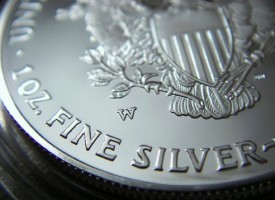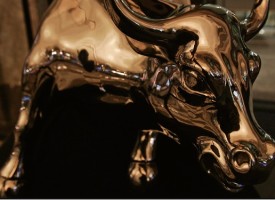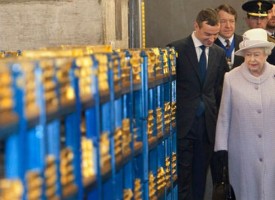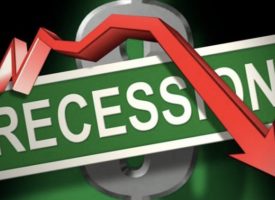Today one of the top money managers in the world spoke with King World News about the Korean crisis, China and gold.
Korean Crisis, China And Gold
Stephen Leeb: “The military concerns raised by the Korean crisis, while certainly scary, are relatively straightforward. So far it has been a war of words as President Trump and Korea’s Kim Jong-un ratchet up their threats. We doubt that North Korea, whatever it claims, has the ability to strike our mainland with a nuclear or even a conventional payload. But it does have chemical and nuclear weapons along with an extremely well-armed military that could inflict millions of deaths in South Korea, one of our two most important Asian allies. And the North Koreans already have shown that Japan, our other key Asian ally, is well within range of its missiles…
IMPORTANT:
To find out which company the richest man in China has invested in, one that
Rick Rule and Sprott Asset Management are pounding the table on that
is quickly being recognized as one of the greatest investment
opportunities in the world – CLICK HERE OR BELOW:
The worst-case scenario would be an attack on North Korea that leads it to retaliate by attacking South Korea and even Japan, leading to further attacks on the North. The Seoul metropolitan area has a population of more than 25 million. The less likely target, Tokyo, is the world’s largest metropolitan area, with a population of over 36 million. And as long as we’re catastrophizing, it is not that hard to imagine China entering the fray. Goodbye world as we know it.
Contemplating such dire possibilities, the only positive comment I can make is that if you own gold, you should be in good shape. Gold is the only currency whose value has withstood the test from every war in more than two millennia. We would make sure, though, that you own the real deal, i.e., actual bullion, not a financial call on the metal bars, such as ETFs.
Ray Dalio, head of the world’s largest hedge fund, advises all investors to have 5 to 10 percent of their assets in gold. I think people’s allocation should be higher. That’s not because of the threat of military catastrophe, however. It’s because this crisis, beyond its military dimensions, contains a potential major geopolitical threat as well.
The current crisis could easily mark America’s last gasp at keeping a foothold in Asia as well as in the rest of the East. These geopolitical implications should be seen as potentially momentous and as enormously positive for gold. If events unfold in such a way that South Korea and Japan turn toward China – for instance, if China is left to monitor North Korea in an agreement under which America severs its military relationship with the South – our allies become China’s allies.
Comments made 30 years ago by the Korean scholar Kyong Soo Lho ring as true today as then. He said:
“The Korean peninsula lies at an extremely important geopolitical and strategic location in Northeast Asia, where the vital interests of the four major powers – the United States, China, Japan, and, the Soviet Union – converge…Korea has historically served as both buffer and invasion route…For the United States, the last to enter the power game in the region, Korea became a focal point and symbol in its postwar containment strategy.”
In short, there is little doubt that losing our position on the Korean peninsula will mean ceding control of the strategic land mass to China, whose navy is more than up to the task of protecting the peninsula. It will almost surely mean a rapprochement between North Korea and South Korea, while Japan will have little choice but to also join with China and its broad-based Eastern initiatives.
Already Prime Minister Abe has been making friendly gestures to Japan’s centuries-old enemy. In early June, he unexpectedly said that Japan was ready to cooperate in China’s One Belt, One Road initiative. This past week, China and Japan held talks in Tokyo about improving relations. According to XinhuaNet, Song Tao, a highly placed Chinese official, said China is ready and willing to “promote friendship between the two peoples and promote cooperation under the Belt and Road initiative.” Abe echoed Song’s comments, offering assurance of Japan’s desire to cooperate in the relationship. Abe has proposed a trilateral summit – to include South Korea – for later this year or in early 2018. Also planned for 2018 are reciprocal state visits by Abe and Xi. The necessity of a strong relationship between China and Japan is becoming ever clearer.
Strategically, China’s strong position in central Asia, which it has developed under the auspices of the Shanghai Cooperation Organization (SCO), combined with de facto control of the Korean peninsula and a navy whose technological weaponry is likely superior to that of our navy, is tantamount to control of the East. And that is a big deal, to say the least. As I’ve noted many times in these interviews, the Eastern part of the world has far greater growth potential than the West. Not only does it start with an economy that, in total, is bigger than the West’s, it’s also growing more rapidly from this larger base.
The East also has a much larger endowment of natural resources than the West has. Indeed, looking just at hydrocarbons, approximately 75 percent of the earth’s reserves are in the East. And when it comes to lesser-known but critical resources – critical for everything from an advanced military to electric cars – such as heavy rare earths, cobalt, graphite, and many others – these are mined mainly in the East, with many almost completely controlled by China. One consequence is the technological sophistication of China’s armed forces, especially its navy.
China, I continue to believe, aims to become the hub of economic activity throughout the East. Its One Belt, One Road initiative; the Shanghai Cooperation Organization; its BRICS activities, which encompass Brazil, one of the West’s most important resource bases; a growing trading relationship with Germany; control of the vital port at the foot of Greece – these all point to a determination to control Eurasia and the rest of the East.
If the Korean crisis ends with the U.S. abandoning or curtailing its position on the Korean peninsula, China would be that much closer to becoming the world’s true Middle Kingdom. For the foreseeable future, the country that commands the East will for practical purposes command the Earth.
A Gold-Centered Monetary System
One indisputable result would be that the dollar would cease to be the reserve currency in the East and possibly in the world at large, yielding to a gold-centered monetary system likely to include a basket of currencies. If China succeeds in its ambitions on the Korean peninsula, the time frame for the ascendancy of a gold-based monetary system would be speeded up. But even absent an upending of the current status quo in Korea, China’s economic might already ensures its goal of a new reserve currency is in view. That’s why I believe that gold has already made a major bottom in the context of the correction that started in 2013. Now we’re only waiting for the historic fireworks.
And so yes, the stakes in the Korean crisis are enormously high, shooting war or no shooting war. If the U.S. loses its foothold on the Korean peninsula, we will have forfeited our claim to being a world leader. Investors of all ages and stripes should raise their gold holdings.”
***KWN has just released Dr. Stephen Leeb’s remarkable KWN audio interview and you can listen to it by CLICKING HERE OR ON THE IMAGE BELOW.
***ALSO JUST RELEASED: Price Of Gold Is Now Approaching “Big Daddy” Breakout. Here Is The Key Price The Gold Bulls Need To Hit! CLICK HERE.
© 2017 by King World News®. All Rights Reserved. This material may not be published, broadcast, rewritten, or redistributed. However, linking directly to the articles is permitted and encouraged.









